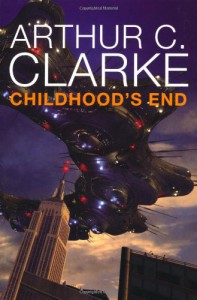 This is the fifth Clarke book I've read in as many years and I'm still waiting for the one that's going to blow my mind. This one didn't do that but it's my favourite since the first one I read: [b:A Fall of Moondust|149059|A Fall of Moondust|Arthur C. Clarke|https://d202m5krfqbpi5.cloudfront.net/books/1302382681s/149059.jpg|1397287].
This is the fifth Clarke book I've read in as many years and I'm still waiting for the one that's going to blow my mind. This one didn't do that but it's my favourite since the first one I read: [b:A Fall of Moondust|149059|A Fall of Moondust|Arthur C. Clarke|https://d202m5krfqbpi5.cloudfront.net/books/1302382681s/149059.jpg|1397287].This one deals with alien contact but this time aliens arrive only to become our benign overlords, eliminating war, poverty and suffering, although they've also put a halt to mankind's space exploration. Who they are and why they have done this is revealed gradually throughout the book.
Important themes include parapsychology and religion; Clarke is keen to rationalise these phenomena in a new way, bringing many different strands together to provide a vehicle for the metamorphosis that occurs at the end of the story.
There are big ideas presented here and Clarke doesn't let the narrative get bogged down in the nitty-gritty technicalities that sometimes happens in his other books (and other works of hard-SF). A good, solid piece of SF although still, for me, lacking the "wow" factor that I was hoping for.
Hello America
 I don't know if I'm just getting tired of Ballard's parallel explorations of post-apocalyptic landscapes and his character's inner physiological landscapes, whether the particular theme used in this book just didn't resonate with me, or whether this was just one of his poorer efforts. Whatever the case it's lead me to the conclusion that I've read enough Ballard to be going on with for a while.
I don't know if I'm just getting tired of Ballard's parallel explorations of post-apocalyptic landscapes and his character's inner physiological landscapes, whether the particular theme used in this book just didn't resonate with me, or whether this was just one of his poorer efforts. Whatever the case it's lead me to the conclusion that I've read enough Ballard to be going on with for a while.The American Dream has collapsed after depleting all its natural resources and suffering severe environmental catastrophe but lives on in the minds of certain individuals, a century later, as they attempt to explore this near abandoned continent. Can America be restored to its former glory with our protagonist Wayne as its new president? Can his hopes and dreams for America be reconciled with those he is travelling with and those he meets along the way?
I found the author's ideas somewhat preposterous and the plot and character developments felt shoehorned into narrative. Ballard knew what he what story he wanted to tell but not really how to tell it, or that's how it seemed to me anyway. It had it's moments and wasn't a complete failure but overall it fell flat.
The Empty House And Other Ghost Stories
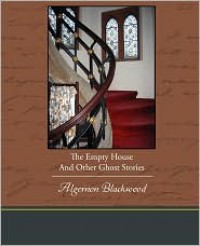 I've come to expect a very high standard from Blackwood so when I encounter something of his that is only so-so, it might well be that I come across overly negative. This is only because I have such a high regard for him generally.
I've come to expect a very high standard from Blackwood so when I encounter something of his that is only so-so, it might well be that I come across overly negative. This is only because I have such a high regard for him generally.This is Blackwood's first published collection and, in my opinion, it shows. This is a Blackwood not yet at the height of his powers, writing supernatural stories in a more conventional manner than we went on to do later. Stories like "The Empty House" and "A Case of Evesdropping" are classic examples of quite predictable and deeply conventional ghost stories, albeit still told with is unique voice.
A few of the stories begin to rise above this. "The Wood of the Dead" is spectacular just for the way he evokes the feel of the time and place so well even though the plot itself is nothing special. In "A Suspicious Gift" a suitably weird and curious story develops only to fall flat at the end with the cop-out of a "it was all only a dream" finish.
The highlights of the collection for me were "With Intent to Steal" that was a most effective horror story and "The Strange Adventures of a Private Secretary in New York" which is just downright weird.
Perhaps this is a good place to start with his work but even then I'd chose a collection that spanned his career (such as [b:Ancient Sorceries and Other Weird Stories|93220|Ancient Sorceries and Other Weird Stories|Algernon Blackwood|https://d202m5krfqbpi5.cloudfront.net/books/1347255981s/93220.jpg|574316]). Still, as I said, there's nothing really bad in here. A solid collection of mostly conventional Edwardian ghost stories.
 1
1
Some of Your Blood
 This isn't the horror novel I thought it was going to be and it's not the "straight crime" novel that the blurb on the front claimed it to be. In fact I'm not really sure how to classify it but maybe I shouldn't worry about it.
This isn't the horror novel I thought it was going to be and it's not the "straight crime" novel that the blurb on the front claimed it to be. In fact I'm not really sure how to classify it but maybe I shouldn't worry about it. There were elements of horror, there's a kind of non supernatural notion of a vampire here, and there are crimes but this doesn't start with the crime and then try to work out who did it, rather it starts with the perpetrator and then tries to find out what it is he did (and why).
The narrative is presented as a psychiatric case file on which you, the reader, are snooping on, with mail correspondence, interview transcripts and essays attached.
Quite an interesting and somewhat different tale by an author known primarily for his science fiction.
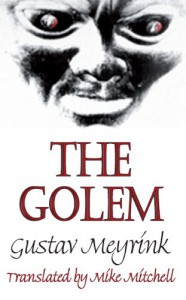 I didn't really know what to expect before reading this and afterwards it is quite hard to talk about.
I didn't really know what to expect before reading this and afterwards it is quite hard to talk about.Initially I think it was quite hard to get into, being introduced with new characters with each new chapter and the somewhat disjointed feel from chapter to chapter. But after a while one gets into the flow and embroiled in the story.
Looking back, it doesn't really feel like a horror story as such, although it definitely fits into the category of a weird tale with it's strange occurrences, unreliable narration and surreal imagery.
Apparently, this is Meryink's most accessible novel. As such, I doubt I'll be rushing out to try any of his other work. I'm glad I read this as it certainly was an...experience. I could probably do with re-reading at some point too.
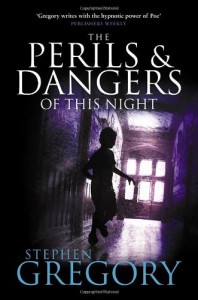 A well crafted, atmospheric and chilling account of the murderous events that took place one Christmas when a boy was left at boarding school by his uncaring mother with his stern and abusive headmaster.
A well crafted, atmospheric and chilling account of the murderous events that took place one Christmas when a boy was left at boarding school by his uncaring mother with his stern and abusive headmaster.A good build up was somewhat let down, I felt, by an over gory and drawn out climax as vengeful, former pupil Price finally lets loose.
But still, a good introduction to this author and I definitely intend to read some more of his work.
 1
1
 A disturbing, near future dystopian vision of Britain that is frighteningly plausible.
A disturbing, near future dystopian vision of Britain that is frighteningly plausible. Besides the central premise, there are many other extrapolations arising from society as we know it to construct something that, taken as a whole, paints quite a worrying picture of our future. There are several parallels with George Orwell's "1984" although this story presents a far more subtler mechanism of control, and one no doubt more relevant to today's readers. What we have here is a "nanny state" tyranny, one that is attempting to preserve the illusion of freedom whilst being completely intolerant of dissent.
While I found all this fascinating, the side of the story that looked at Hugh's visions of the past/future somewhat of an unwanted distraction from the main premise.
An essential read for anyone interested in modern political/social issues.
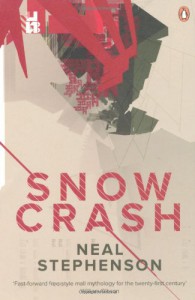 I've never been much of a fan of the so called "cyber punk" sub genre of SF and this book, while it certainly had its moments, is not going to change that. This is also my first experience of the work of Neal Stephenson and I can't say that he's particularly impressed me but since he doesn't just write cyber punk novels, I shall certainly try something else.
I've never been much of a fan of the so called "cyber punk" sub genre of SF and this book, while it certainly had its moments, is not going to change that. This is also my first experience of the work of Neal Stephenson and I can't say that he's particularly impressed me but since he doesn't just write cyber punk novels, I shall certainly try something else.I just found many of the things that happened pointlessly preposterous. They weren't needed to help advance the narrative or illuminate the characters, as if they were included merely for impress the reader for their own sake. The characters didn't likewise impress me with their street smart attitude and their general coolness as I felt that I was expected to be. Maybe this is all just a sign of how times have moved on and what might have been impressive twenty years ago is far less so now.
The central conceit was quite interesting but it was couched in so much exposition about ancient myth and legend that, however historically accurate it might well be, I found hard it to take in. If you are particularly interested in the history and culture of ancient Mesopotamia you would probably find these parts fascinating.
Oh, it was entertaining enough and I frequently found myself gripped by the events taking place, wanting to know what would happen next. But I guess this is not the kind of thing I'm looking for in SF. I guess I just found the intense cynicism a little wearing.
 An unwilling couple are stranded on a strange, distant planet while the others attempt to get back to earth leaving only a promise that they will send help. This story starts around a century and a half later and their descendants now number over five hundred, most of which are beset with deformities arising from their incestuous ancestry. They have formed an inward looking, insular society that does nothing but try to survive, clustered around their circle of stones, their one hope that help will eventually arrive from earth and whisk them all away. But there is now one who is not content to carry on living this way, determined to shake things up but will he be their saviour or merely tear them apart?
An unwilling couple are stranded on a strange, distant planet while the others attempt to get back to earth leaving only a promise that they will send help. This story starts around a century and a half later and their descendants now number over five hundred, most of which are beset with deformities arising from their incestuous ancestry. They have formed an inward looking, insular society that does nothing but try to survive, clustered around their circle of stones, their one hope that help will eventually arrive from earth and whisk them all away. But there is now one who is not content to carry on living this way, determined to shake things up but will he be their saviour or merely tear them apart?An interesting premise and an easy going prose style made this a pleasure to read. The world on which they are stranded on, and wildlife that inhabit it, is evocatively described bringing it effortlessly to life.
Biblical parallels abound, some more explicit than others. The tensions that arise between the young and old, between conservatives and progressives, are played out. The hearts of those who lead are examined, to what extent are they guided by the common good or merely power and glory?
But for the sexually explicit content (reflecting the family's relaxed attitude towards promiscuity) I thought that this felt like a "young-adult" novel because of somewhat heavy handed way the author went about making his point and general hand holding of the reader throughout. But besides that I thought it was a very good, if not overly original, story.
 These days I don't let myself pick up random books by authors I have heard talked about. I make sure that I know which books to look for first. But this has been on my shelf for a while, back from the time when I wasn't quite so meticulous and did pick up random books. And getting to the end of this reminded me why I revised by book acquisition strategy!
These days I don't let myself pick up random books by authors I have heard talked about. I make sure that I know which books to look for first. But this has been on my shelf for a while, back from the time when I wasn't quite so meticulous and did pick up random books. And getting to the end of this reminded me why I revised by book acquisition strategy!A lost world adventure story that mingles elements of science fiction with fantasy as the protagonist Graydon discovers a hidden valley in the Andes that hides humans of an ancient race that have conquered ageing as well as having created strange animal-human hybrids. He falls in love with a woman he meets there and becomes embroiled, and ultimately pivotal, in a conflict between two warring factions. Can he help stop an ancient evil from rising again or will he become its instrument?
While it did have its moments, it felt overall to have dated quite badly. It was often slow and plodding, peppered with antiquated ideas and simplistic philosophising, its characters were shallow and one dimensional. I didn't feel that the author did a good job of bringing this lost world to life, evoking a sense of wonder in the reader.
One day I will find a copy of [b:The Moon Pool|863689|The Moon Pool|A. Merritt|http://d202m5krfqbpi5.cloudfront.net/books/1348631267s/863689.jpg|937185] which is the book that most seem to cite as being his best work but until then, I won't pick up anything else I see by him.
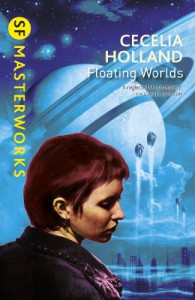 I'm not really sure what to make of this one. For me, it struggled to get going, was overly long and petered out with an ending that left you wondering why you bothered. Don't get me wrong, it certainly had it's moments. Most of the time I was fairly gripped, wanted to find out what would happen, where it was going. And for a while, I thought I knew, until the ending let me down. The dialogue took some getting used to too, always at cross purposes, talking past each other.
I'm not really sure what to make of this one. For me, it struggled to get going, was overly long and petered out with an ending that left you wondering why you bothered. Don't get me wrong, it certainly had it's moments. Most of the time I was fairly gripped, wanted to find out what would happen, where it was going. And for a while, I thought I knew, until the ending let me down. The dialogue took some getting used to too, always at cross purposes, talking past each other.Paula Mendoza was an interesting, complex character who was full of contradictions. She is both an idealist and a pragmatist, dispassionate yet often guided by her passions. She is rigid in her ideals as an anarchist, feminist and pacifist yet chooses to live in a rigidly hegemonic, patriarchal and imperialistic society in order to pursue her nebulous ends. At one point she is violently raped and yet is mystifyingly quick to forgive (something that a male author certainly could not have gotten away with).
The low rating for this book belies the fact that there is much of interest in here. If only it were weaved together a little more concisely and coherently with a more definite purpose. Then again, perhaps I just don't get it?
 After managing to overcome my extreme distaste for the cover (possibly the worst horror cover I've ever encountered) I plunged into the novel not knowing what to expect but trusting the judgement of the person who recommended it to me.
After managing to overcome my extreme distaste for the cover (possibly the worst horror cover I've ever encountered) I plunged into the novel not knowing what to expect but trusting the judgement of the person who recommended it to me.This story managed to maintain a healthy respect for the traditions and writers of classic weird horror whilst not being overly derivative. It felt very modern. Many great authors and works were referenced, both within the narrative itself, and in the acknowledgements. Caitlín is obviously a fan of the genre herself. The horror itself was most gradually introduced, its insidious nature remaining subtly felt throughout and its precise nature ambiguous to the end.
To what extent could the experiences of the protagonist be attributed to guilt ridden unconscious self torture, her recently diagnosed neurological disorder or her proximity to a mysterious, malevolent force of nature? On the other hand, how much was invented or distorted by the self confessed unreliable narrator?
The sassy, cynical, swearing, lesbian protagonist places this story firming in a contemporary setting. Several fairly graphic sex scenes are definitely aimed at people with modern sensibilities. However, the gradual erosion of a cynic's scepticism, the abandonment of her rational world, view was convincingly portrayed and not too readily given up.
A talented writer so don't let the cover put you off if you are new to her writing.
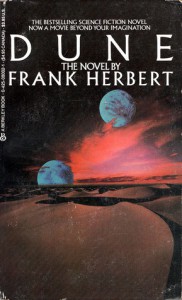 How can I call myself a fan of SF without having read this, the book that regularly tops polls and lists of the best SF? Why have I, only now, come to read it? And now that I have, do I think it lives up to its reputation?
How can I call myself a fan of SF without having read this, the book that regularly tops polls and lists of the best SF? Why have I, only now, come to read it? And now that I have, do I think it lives up to its reputation?The reason I have put off for so long reading this largely stems from my distant memories of being confused and frustrated by the film adaptation many years ago, and my memories of the only other book by Frank Herbert I've read (some fifteen years ago): [b:The Dosadi Experiment|1937507|The Dosadi Experiment|Frank Herbert|http://d202m5krfqbpi5.cloudfront.net/books/1224557227s/1937507.jpg|6983472] (that also left be confused and frustrated). However, being of such high regard, featuring in the SF Masterworks series and also featuring in the NPR: Top 100 Science Fiction & Fantasy list for which I had committed to a reading challenge, it seemed I could put it off no longer.
And to be honest, I'm glad I did. It was much better than I thought it would be. I was ready to hate it but was pleasantly surprised. It didn't take me long to get into it and I found it engaging and interesting throughout, although it felt a little slow in the middle.
One thing I've noticed about Herbert's style is that he likes intrigue and dialogue layered with multiple levels of meaning. Where I found this a little too overbearing and intense in the "Dosadi Experiment", I found it pitched just right in this book. Perhaps it was helped by the way the characters thought processes behind the dialogue were often revealed, not leaving the reader to do all the work.
One thing I noticed is that this is every bit a work of fantasy as it is SF. Not that that bothers me. Just thought I'd point that out. I'm sure readers of fantasy will get a lot of enjoyment from this, even if they don't normally read SF.
Anyway, despite the somewhat abrupt ending, I'm not sure yet whether I'll read any of the sequels. But I'll certainly consider Frank Herbert again rather than dismissing him as an author I don't like.
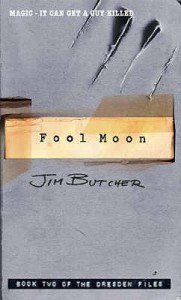 Only about three years after reading the first book I got around to reading this, the second book in the Dresden Files series. It's not that I'm an enormously slow reader (I did read some other books in between), rather that I wasn't sure I wanted to carry on with the series, despite this book having been sitting on my shelf for ages.
Only about three years after reading the first book I got around to reading this, the second book in the Dresden Files series. It's not that I'm an enormously slow reader (I did read some other books in between), rather that I wasn't sure I wanted to carry on with the series, despite this book having been sitting on my shelf for ages.Having read it though, I'm glad I did. In this unusual and protracted heat wave we've been enduring/enjoying I felt my powers of concentration were not up to their usual levels and needed something light and entertaining. And that's exactly what I got.
This time we see Harry up to his eyes in werewolves of nearly every kind. Indeed, it seems that the author was intent on packing in as many different kinds as he could think of. And on top of that his relationship with Murphy is at an all time low and he's completely broke.
I found this a very enjoyable read right the way through even though I found myself somewhat frustrated by the fact that Harry seems to rely on pure luck to carry him through most tricky situations; the kind of reliance that one would expect to lead to his demise if he carried on that way for long. Some of the knife edge situations, particularly the climatic end scene feel too contrived to be that convincing. And when I finished I felt like one does after eating fast food; although satisfying while one is eating it, one has a nagging hollow feeling afterwards. I certainly wasn't left pondering the implications of what I had just read.
Anyway, as good as the first book in my opinion. If you want a tense and exciting read but somewhat light and fluffy, look no further than this.
The Boats Of The Glen Carrig
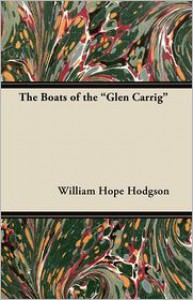 An interesting edition this; seemingly a scan and reprint of an edition originally released in the 1940's USA, complete with period advertisements, tiny text and a whole extra story at the end: "Even a Worm" by J. S. Bradford.
An interesting edition this; seemingly a scan and reprint of an edition originally released in the 1940's USA, complete with period advertisements, tiny text and a whole extra story at the end: "Even a Worm" by J. S. Bradford.I liked it but my expectations started out low, I have to say. When I started out with Hodgson, I read some great stories, "House on the Borderland" was supperb and "Carnacki the Ghost Finder" were generally very good. Then I read some weaker stories, "Ghost Pirates" and the terrible "In the Nightland". I've come to the conclusion that Hodgson just doesn't do dialogue very well and he really should have avoided effecting a pseudo archaic prose.
But this story I found genuinely quite effective and creepy. An island full of trees that turn to flesh and send out tendrils to capture unsuspecting prey that they can absorb into their mass. Another island inhabited by blood sucking fungal lifeforms that have emerged from a black, bottomless pit. A continent of weed floating on the sea that harbours see monsters including giant crabs, squids and the slithering weed-men.
All good stuff but I still found the narrative style a little dry and lack of dialogue and character establishment infuriating. Worth a read especially if you like nautically themed horror stories.
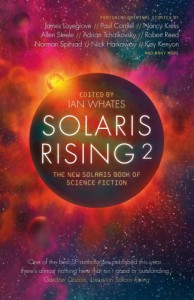 Another instalment of new SF short stories demonstrating the breadth and depth that the genre has to offer in 2013. This contained some familiar authors but many more that weren't, as it should be with anthologies of this kind.
Another instalment of new SF short stories demonstrating the breadth and depth that the genre has to offer in 2013. This contained some familiar authors but many more that weren't, as it should be with anthologies of this kind.Of course, with such a diverse range of themes and all new stories, you're never going to like all of them. I don't know if it was just me but I felt that the quality of the stories generally improved as the collection went on.
Environmental catastrophy features features in quite a few stories such as “More” by Nancy Kress, “Shall Inherit” by James Lovegrove, “The Spires of Greme” by Kay Kenyon and “With Fate Conspire” by Vandana Singh. Alien contact is a predominate theme in others such as “Tom” by Paul Cornell, “Feast and Famine” by Adrian Tchaikovsky and “The Circle of Least Confusion” by Martin Sketchley. AI problems are explored in “Ticking” by Allen Steele and “Manmade” by Mercurio D. Rivera while time paradoxes are considered in “The Time Gun” by Nick Harkaway and “With Fate Conspire” by Vandana Singh.
A few stories were particularly relevant to modern day concerns like in “Pearl in the Shell” by Neil Williamson in which music has been completely analysed, classified into it's essential categories and fully copyrighted so that no one bothers trying to write new music any more. In “The First Dance” by Martin McGrath we see the what might happen if there was a facility that could record all your memories to be played back at will...at the right price. And in “Whatever Skin You Wear” by Eugie Foster everyone has become so dependent on being hooked up to the net and hiding behind facades that widespread panic ensures when there is a brief outage of service.
Also worth a mention (but hard to classify) is “The Lighthouse” by Liz Williams which presents a haunting vision of a potential future for humanity and “Bonds” by Robert Reed in which a fraudster who becomes rich after inventing a theory about the interconnectedness of everything turns out to have understood more about the true nature of the universe than anyone suspected.
If you're a fan of SF, you're bound to find something of interest here.



